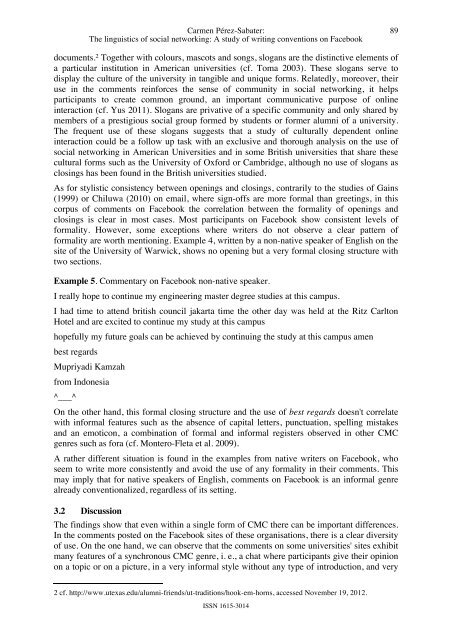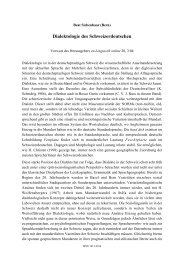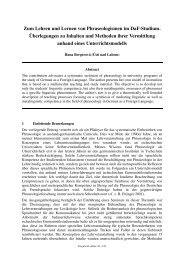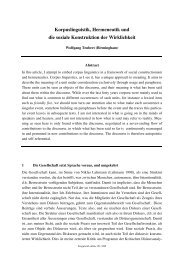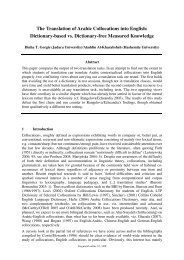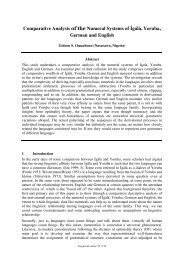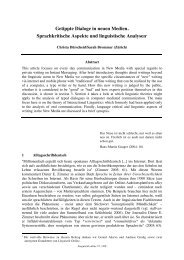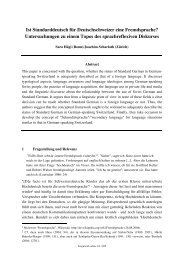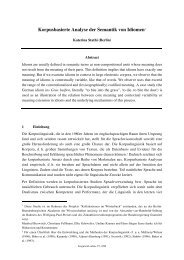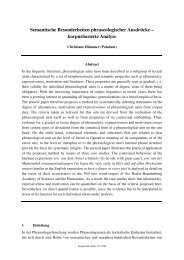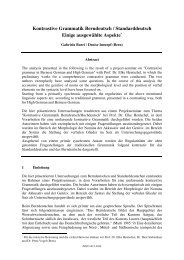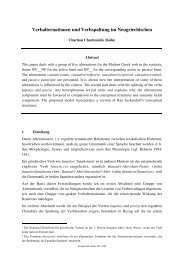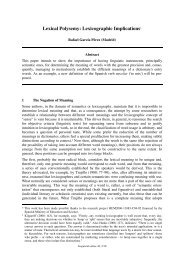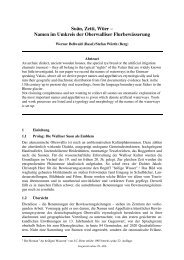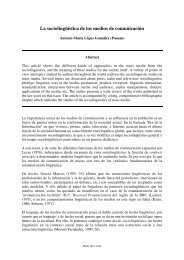A Study of Writing Conventions on Facebook - Linguistik online
A Study of Writing Conventions on Facebook - Linguistik online
A Study of Writing Conventions on Facebook - Linguistik online
Create successful ePaper yourself
Turn your PDF publications into a flip-book with our unique Google optimized e-Paper software.
Carmen Pérez-Sabater:The linguistics <str<strong>on</strong>g>of</str<strong>on</strong>g> social networking: A study <str<strong>on</strong>g>of</str<strong>on</strong>g> writing c<strong>on</strong>venti<strong>on</strong>s <strong>on</strong> <strong>Facebook</strong>89documents. 2 Together with colours, mascots and s<strong>on</strong>gs, slogans are the distinctive elements <str<strong>on</strong>g>of</str<strong>on</strong>g>a particular instituti<strong>on</strong> in American universities (cf. Toma 2003). These slogans serve todisplay the culture <str<strong>on</strong>g>of</str<strong>on</strong>g> the university in tangible and unique forms. Relatedly, moreover, theiruse in the comments reinforces the sense <str<strong>on</strong>g>of</str<strong>on</strong>g> community in social networking, it helpsparticipants to create comm<strong>on</strong> ground, an important communicative purpose <str<strong>on</strong>g>of</str<strong>on</strong>g> <strong>on</strong>lineinteracti<strong>on</strong> (cf. Yus 2011). Slogans are privative <str<strong>on</strong>g>of</str<strong>on</strong>g> a specific community and <strong>on</strong>ly shared bymembers <str<strong>on</strong>g>of</str<strong>on</strong>g> a prestigious social group formed by students or former alumni <str<strong>on</strong>g>of</str<strong>on</strong>g> a university.The frequent use <str<strong>on</strong>g>of</str<strong>on</strong>g> these slogans suggests that a study <str<strong>on</strong>g>of</str<strong>on</strong>g> culturally dependent <strong>on</strong>lineinteracti<strong>on</strong> could be a follow up task with an exclusive and thorough analysis <strong>on</strong> the use <str<strong>on</strong>g>of</str<strong>on</strong>g>social networking in American Universities and in some British universities that share thesecultural forms such as the University <str<strong>on</strong>g>of</str<strong>on</strong>g> Oxford or Cambridge, although no use <str<strong>on</strong>g>of</str<strong>on</strong>g> slogans asclosings has been found in the British universities studied.As for stylistic c<strong>on</strong>sistency between openings and closings, c<strong>on</strong>trarily to the studies <str<strong>on</strong>g>of</str<strong>on</strong>g> Gains(1999) or Chiluwa (2010) <strong>on</strong> email, where sign-<str<strong>on</strong>g>of</str<strong>on</strong>g>fs are more formal than greetings, in thiscorpus <str<strong>on</strong>g>of</str<strong>on</strong>g> comments <strong>on</strong> <strong>Facebook</strong> the correlati<strong>on</strong> between the formality <str<strong>on</strong>g>of</str<strong>on</strong>g> openings andclosings is clear in most cases. Most participants <strong>on</strong> <strong>Facebook</strong> show c<strong>on</strong>sistent levels <str<strong>on</strong>g>of</str<strong>on</strong>g>formality. However, some excepti<strong>on</strong>s where writers do not observe a clear pattern <str<strong>on</strong>g>of</str<strong>on</strong>g>formality are worth menti<strong>on</strong>ing. Example 4, written by a n<strong>on</strong>-native speaker <str<strong>on</strong>g>of</str<strong>on</strong>g> English <strong>on</strong> thesite <str<strong>on</strong>g>of</str<strong>on</strong>g> the University <str<strong>on</strong>g>of</str<strong>on</strong>g> Warwick, shows no opening but a very formal closing structure withtwo secti<strong>on</strong>s.Example 5. Commentary <strong>on</strong> <strong>Facebook</strong> n<strong>on</strong>-native speaker.I really hope to c<strong>on</strong>tinue my engineering master degree studies at this campus.I had time to attend british council jakarta time the other day was held at the Ritz Carlt<strong>on</strong>Hotel and are excited to c<strong>on</strong>tinue my study at this campushopefully my future goals can be achieved by c<strong>on</strong>tinuing the study at this campus amenbest regardsMupriyadi Kamzahfrom Ind<strong>on</strong>esia^___^On the other hand, this formal closing structure and the use <str<strong>on</strong>g>of</str<strong>on</strong>g> best regards doesn't correlatewith informal features such as the absence <str<strong>on</strong>g>of</str<strong>on</strong>g> capital letters, punctuati<strong>on</strong>, spelling mistakesand an emotic<strong>on</strong>, a combinati<strong>on</strong> <str<strong>on</strong>g>of</str<strong>on</strong>g> formal and informal registers observed in other CMCgenres such as fora (cf. M<strong>on</strong>tero-Fleta et al. 2009).A rather different situati<strong>on</strong> is found in the examples from native writers <strong>on</strong> <strong>Facebook</strong>, whoseem to write more c<strong>on</strong>sistently and avoid the use <str<strong>on</strong>g>of</str<strong>on</strong>g> any formality in their comments. Thismay imply that for native speakers <str<strong>on</strong>g>of</str<strong>on</strong>g> English, comments <strong>on</strong> <strong>Facebook</strong> is an informal genrealready c<strong>on</strong>venti<strong>on</strong>alized, regardless <str<strong>on</strong>g>of</str<strong>on</strong>g> its setting.3.2 Discussi<strong>on</strong>The findings show that even within a single form <str<strong>on</strong>g>of</str<strong>on</strong>g> CMC there can be important differences.In the comments posted <strong>on</strong> the <strong>Facebook</strong> sites <str<strong>on</strong>g>of</str<strong>on</strong>g> these organisati<strong>on</strong>s, there is a clear diversity<str<strong>on</strong>g>of</str<strong>on</strong>g> use. On the <strong>on</strong>e hand, we can observe that the comments <strong>on</strong> some universities' sites exhibitmany features <str<strong>on</strong>g>of</str<strong>on</strong>g> a synchr<strong>on</strong>ous CMC genre, i. e., a chat where participants give their opini<strong>on</strong><strong>on</strong> a topic or <strong>on</strong> a picture, in a very informal style without any type <str<strong>on</strong>g>of</str<strong>on</strong>g> introducti<strong>on</strong>, and very2 cf. http://www.utexas.edu/alumni-friends/ut-traditi<strong>on</strong>s/hook-em-horns, accessed November 19, 2012.ISSN 1615-3014


